| Author |
 Topic Topic  |
|
|
zara
Gold Member
   
 United Kingdom United Kingdom
1066 Posts |
 Posted - 20 Dec 2005 : 3:34:16 PM Posted - 20 Dec 2005 : 3:34:16 PM




|
I'm finding this subject absolutely fascenating (sp?)
Shall we start a new thread just dedicated to this subject?
|
"to his virtues ever kind, and to his faults a little blind". |
|
Report to moderator
|
|
|
spirit
Gold Member
   
England
567 Posts |
|
|
Pashon2001
Platinum Member
    

3575 Posts |
|
|
Pashon2001
Platinum Member
    

3575 Posts |
|
|
Basilisk
Gold Member
   
United Kingdom
521 Posts |
 Posted - 20 Dec 2005 : 10:48:34 PM Posted - 20 Dec 2005 : 10:48:34 PM




|
Actually, that's not a *very* extreme sabino - very extreme sabinos are totally white, or with just a little colour left - like the famous HAAP Snowy River: - very extreme sabinos are totally white, or with just a little colour left - like the famous HAAP Snowy River:
http://www.arabpinto.com/purebred_stallions/images/snowy_r.htm
(click on the small photos to see bigger bodyshots - click on the name for his pedigree).
From the photo of Zeus II we have been discussing on the original thread, he looks as if he might have been a fairly extensive sabino - I'm just waiting to get a clear scan to see just how extensive his markings were. What a shame he was killed.
Keren |
Report to Moderator  |
|
|
Sundance
Racing Moderator
   
England
932 Posts |
 Posted - 21 Dec 2005 : 09:32:54 AM Posted - 21 Dec 2005 : 09:32:54 AM




|
These Sabino colours are amazing - would OAS Panache be considered a Sabino? Is it a characteristic of mainly crabbets?
I love Crystal Magicians colour that real deep liver chestnut. I have a mare this colour but her foals all seem to follow the sire's colour (a light chestnut and bay to date). This mares dam Autumn Copper Beech was this colour and the her sisters have all inherited the colour but their next generation doesn't seem to be inheriting it. I don't and haven't bred for colour (breed for performance) but she is currently in foal to a race stallion who is dark brown and I would love her to produce a liver chestnut filly but we'll see.
I also have a light chesnut filly with flaxen mane and tail and yet both parents were liver chestnut. I guess its all in the lap of the gods!
Paul |
Paul
www.zayinarabianstud.co.uk |
Report to Moderator  |
|
|
Kash
Platinum Member
    

England
3777 Posts |
|
|
gu-ku-vi
Gold Member
   
Denmark
744 Posts |
|
|
Pashon2001
Platinum Member
    

3575 Posts |
|
|
Pashon2001
Platinum Member
    

3575 Posts |
 Posted - 21 Dec 2005 : 6:45:37 PM Posted - 21 Dec 2005 : 6:45:37 PM





|
| The only thing with Haap snowy river, who obviously has extreme white and minimal colour is its a pity he isnt 'solid' in his markings. Have seen quite a few pinto arabs in america, I wonder if they will get as popular over here? |
     
www.jarvastud.com http://hocon.webs.com/ |
Report to Moderator  |
|
|
C.J.
Silver Member
  

United Kingdom
288 Posts |
 Posted - 21 Dec 2005 : 11:03:58 PM Posted - 21 Dec 2005 : 11:03:58 PM




|
Keren
I’ve just had another go at sending you the photo of ZEUS II but thought it might be a good idea to post it on this thread as well as he looks a most unusual colour. He’s registered in Vol 9 of the Stud Book and was bred by Lady Wentworth at Crabbet Park. He was foaled in 1957 and his entry is as follows:
Grey; narrow blaze extending into near nostril and onto upperlip. Spot on offside of underlip. Near fore stocking. Off hind long sock.
Sire: Silver Vanity (Oran x Silver Gilt by Indian Gold x Silver Fire)
Dam: Ziree El Wada (Naseel x Rose Du Sable by Jaleel x Nisan)
Unfortunately, ZEUS II died in a car accident in 1966. However, he has two half brothers entered on the same page in Vol 9 – ZODIAC f 1959 a chestnut by Rill and ZAREEF f 1961 listed as ‘chestnut or grey’ again by Rill.
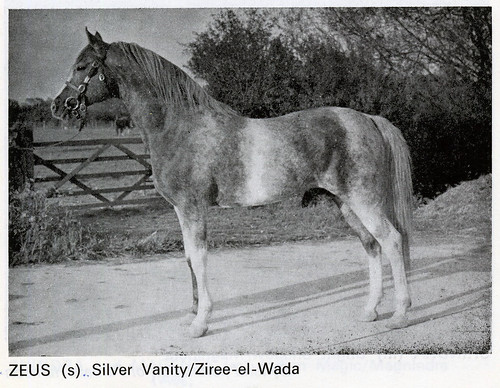
Caroline
|
"And God said to the Wind 'Be thou gathered together.' And the wind was gathered together....And he created from a handful of wind a horse of chestnut colour like gold. And God let loose the Swift Runner, and he went on his way neighing."
   |
Report to Moderator  |
|
|
zara
Gold Member
   

United Kingdom
1066 Posts |
 Posted - 22 Dec 2005 : 8:15:55 PM Posted - 22 Dec 2005 : 8:15:55 PM




|
Zeus reminds me of an arab stallion around the Manchester area in the early 1970. His name was AZENCO I dont know if he was registered or not. I had a part bred by him (7/8) who was chestnut with a lot of roaning. A friends part bred was solid chestnut, but rather a weak colour. ( a point of interest---both these geldings has iffy fore legs, upright pastern or pasterns, interfered/brushhed quite high,very narrow chested. Good temperaments though.)
Zeus looks lovely, very interesting colour/markings. |
"to his virtues ever kind, and to his faults a little blind". |
Edited by - zara on 22 Dec 2005 8:19:29 PM |
Report to Moderator  |
|
|
dogaroo
Bronze Member
 
United Kingdom
143 Posts |
 Posted - 23 Dec 2005 : 08:11:47 AM Posted - 23 Dec 2005 : 08:11:47 AM




|
| I am waiting for someone to mention TAMPA a lovely plun colour with flaxen mane and tail who I am sure is still around. |
Report to Moderator  |
|
|
NPA Arabians
Moderator
    

United Kingdom
2980 Posts |
 Posted - 23 Dec 2005 : 09:08:19 AM Posted - 23 Dec 2005 : 09:08:19 AM




|
Jill - Azenco - didn't Rhoney have a stallion called something like that about that time? Although something is telling me he was partbred? (god i wish my memory was better!)
|
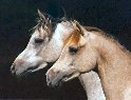 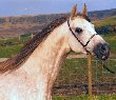    
Jayne Armstrong - NPA Arabians
:-) :-) :-) :-) |
Report to Moderator  |
|
|
zara
Gold Member
   

United Kingdom
1066 Posts |
 Posted - 23 Dec 2005 : 11:43:47 AM Posted - 23 Dec 2005 : 11:43:47 AM




|
NPA,I dont know, sorry! My dad bought me the gelding from a farm which did livery in Mottram. My friend lived in Hayfield, so i expect the stallion was very local.
About colour, Horse Genetics by Ann T Bowling is a good book. on page 31 it says a bit about Silver Dapple. quote " the gene effects are seen conspicuously on genetically black horses in which the coatcolour is diluted to a chocolate or black-chocolate, often with dapples,and the mane and tail are diluted to silver grey or flaxen. On genetically bay horses, the gene produces colour dilution so that the horse is usually describes as a as a silver-maned chestnut, but the legs retain some darker pigment.....the gene probably has little effecton chestnut coat colour beyond producing a flaxen mane and tail."it goes onto say that the dapple name is misleading as dapples are not always associated with the colour.
I wonder if something similar is happening with the plum? a sprt of dilute black perhaps? |
"to his virtues ever kind, and to his faults a little blind". |
Report to Moderator  |
|
|
zara
Gold Member
   

United Kingdom
1066 Posts |
 Posted - 23 Dec 2005 : 11:47:48 AM Posted - 23 Dec 2005 : 11:47:48 AM




|
| Also intreaguing ( I wish i could spell!)is that the roan gene doesnt exist in arabs ( so i've read) but some arabs look like they are roans --including the chestnut 7/8 part bred i used to own. |
"to his virtues ever kind, and to his faults a little blind". |
Report to Moderator  |
|
|
swalk
Gold Member
   
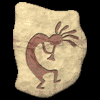
United Kingdom
769 Posts |
 Posted - 23 Dec 2005 : 1:01:33 PM Posted - 23 Dec 2005 : 1:01:33 PM





|
| We used to have a gelding Saulm by Ludomino who was very roan! He had a flaxen mane and tail and the rest of him was a sort of salmon pink colour - very unusual. As far as I know he never greyed out, the last time we saw him he was about 12 and his colour hadn't faded at all. I'll try and get a photo of him up |
Report to Moderator  |
|
|
heathermcbreen
Platinum Member
    
England
2132 Posts |
 Posted - 23 Dec 2005 : 1:16:51 PM Posted - 23 Dec 2005 : 1:16:51 PM




|
Can the flaxen mane and tail persist into maturity. A lot of youngstock start out with it and it darkens over the years. My colt (pic below) by Rusleem has an almost white mane and a blond tail. He has roaning on his belly and white throat patches. He looks more like El Saleem (his grandad) in colouring and I wondered if he will keep his almost white mane. I dont know if you would call it roan but he has a lot of white hairs amongst the chestnut over his back and quarters and it gives him a metallic sheen. Rusleem has a darker chestnut mane and tail but is also sabino marked. My chestnut Sabino mare has a big solid white belly patch and used to be bright chestnut with flaxen mane and tail. She is 10 now and gone plum/liver chestnut incl mane and tail.
I am interested to know of pure breds that stayed "blondie" |
Report to Moderator  |
|
|
cassy
Platinum Member
    

United Kingdom
3348 Posts |
 Posted - 23 Dec 2005 : 1:23:04 PM Posted - 23 Dec 2005 : 1:23:04 PM




|
| This is a interesting thread, caasius had almost white mane as a yearling but by time was 3 was a rich chestnut colour though at root where bridlepatch trimmed was very light there |
Angie
 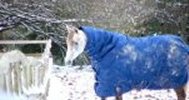 |
Report to Moderator  |
|
|
cassy
Platinum Member
    

United Kingdom
3348 Posts |
 Posted - 23 Dec 2005 : 1:25:59 PM Posted - 23 Dec 2005 : 1:25:59 PM




|
| I am also sure my sec d mare has sabino gene, she has very flashy high whites with chestnut through nr knees and right up inside at back legs but to hock on outside, she has u though wouldnt notice those if didnt know was there and unusual belly splashes with a few white hairs on neck and a few above left shoulder |
Angie
  |
Report to Moderator  |
|
|
Basilisk
Gold Member
   
United Kingdom
521 Posts |
 Posted - 23 Dec 2005 : 2:09:02 PM Posted - 23 Dec 2005 : 2:09:02 PM




|
A brief response - up to my neck in things as you may well imagine at this time of year!
Sabino pinto is considered to be part of the 'overo' family of patterns by geneticists, but what mostpeople generally call 'overo' is in fact the 'frame overo' pattern, which does NOT occur in Arabs. Our only pinto pattern is sabino - which probably originated in the Arab, since there are many Bedouin terms for it, and it only occurs in breeds that have Arab ancestry.
Sabino pinto Arabs have been THE NORM in the UK ever since the days of Crabbet - it is just that the Americans have been very slow to 'click' on the subject: they've only accepted them in the last 10 years or so! In fact they even banned them from the showring at one point. So the UK is actually the best place to look for quality sabino stock!
Angie, your Cob IS a sabino, Dr June has bred several sabino Cobs. It is wildly common in Sec As and not uncommon in Sec Ds.
As well as extensive white markings, sabino also produces roaning and flaxen m/ts, so any bright chestnut like Rusleem with high white and a flaxen m/t is almost undoubtedly a sabino.
There is also another form of roan that exists in the breed - rabicano roan. This produces a roaning pattern similar to that on British Shorthorns and Longhorns. However, we do NOT have true, dark headed roan, such as is seen in the Wesh.
Zara, my project is to discover whether or not we DO have the silver dapple gene in our breed. I have had suspicions about it for many years. That is why I am interested in information/photos of 'plum' coloured Arab horses esp. those with light m/ts. There is a test available for it in the US, but the institution involved appear not to want to test animals from other countries (it only requires a hair sample!).
Keren |
Report to Moderator  |
|
|
Anfi
Gold Member
   

Denmark
1195 Posts |
|
|
Basilisk
Gold Member
   
United Kingdom
521 Posts |
 Posted - 23 Dec 2005 : 6:24:26 PM Posted - 23 Dec 2005 : 6:24:26 PM




|
| Originally posted by Sundance
These Sabino colours are amazing - would OAS Panache be considered a Sabino? Is it a characteristic of mainly crabbets?
I love Crystal Magicians colour that real deep liver chestnut. I have a mare this colour but her foals all seem to follow the sire's colour (a light chestnut and bay to date). This mares dam Autumn Copper Beech was this colour and the her sisters have all inherited the colour but their next generation doesn't seem to be inheriting it. I don't and haven't bred for colour (breed for performance) but she is currently in foal to a race stallion who is dark brown and I would love her to produce a liver chestnut filly but we'll see.
I also have a light chesnut filly with flaxen mane and tail and yet both parents were liver chestnut. I guess its all in the lap of the gods!
Paul
About 60-70% of Arabians worldwide are sabinos  . The gene is incredibly widespread, thanks mainly to the preponderance of Mesaoud blood: Mesaoud was a medium-expression sabino (high white, blaze extending under chin), so it is the norm in Crabbet horses. However, Crabbet also provides "anti sabino" through Queen of Sheba - her bloodlines, particularly through her Babson descendants, knock sabino right out of play. . The gene is incredibly widespread, thanks mainly to the preponderance of Mesaoud blood: Mesaoud was a medium-expression sabino (high white, blaze extending under chin), so it is the norm in Crabbet horses. However, Crabbet also provides "anti sabino" through Queen of Sheba - her bloodlines, particularly through her Babson descendants, knock sabino right out of play.
Some researchers think *all* white markings are the result of sabino - however, the current agreed definition is that any horse with white on the lower lip is definitely sabino. If you dig out my article on sabino in a past edition of the AHS News, you will see the photo there of my minimal sabino mare, who has just one white pastern, a star and strip and a lower lip spot, plus very slight roaning throughout the coat.
Lord Grosvenor's Arabian, as painted by Stubbs, was a sabino, and the pattern also occurs in the TB: some of you may recall seeing the 'chaser Olympian, who ran successfully in the 1990s. The TB route is presumably the way the gene got into the Shire and Clyde, through improving sires used on cart horses in the 18thc.
Keren |
Report to Moderator  |
|
|
Pashon2001
Platinum Member
    

3575 Posts |
 Posted - 23 Dec 2005 : 6:41:30 PM Posted - 23 Dec 2005 : 6:41:30 PM





|
| Interesting the earlier mention of TAMPA. If its the same one ie Kestral x Princess Scenario then the plum filly I have is related. Being out of a Tampa full sister. She had the plum colour and a silver mane and tail, the same as her daughter. |
     
www.jarvastud.com http://hocon.webs.com/ |
Report to Moderator  |
|
|
zara
Gold Member
   

United Kingdom
1066 Posts |
 Posted - 24 Dec 2005 : 12:13:03 PM Posted - 24 Dec 2005 : 12:13:03 PM




|
| Keren, the silver dapple theory is something I have thought for some time now, I am very interested sabino/roaning inheritance too. I'll get back to you after the holidays with some info which may be useful to you. HAPPY XMAS Jill |
"to his virtues ever kind, and to his faults a little blind". |
Report to Moderator  |
|
|
Azara
Bronze Member
 

England
203 Posts |
 Posted - 24 Dec 2005 : 4:51:19 PM Posted - 24 Dec 2005 : 4:51:19 PM




|
Can I just clarify what you mean by the term 'silver dapple'? This is a colour that occurs in Icelandic horses, Highlands and the Rocky Mountain Pony. My own Icelandic mare is a silver dapple carrier. (Her coat colour is genetically black, but her colour is 'mobrunn' in Icelandic - she is cocoa powder brown all over with self mane and tail - there is no correlation in any English breeds.)
There are two main groups of the silver gene in Icelandics producing the classic silver dapple colour and also silver bay.
Some genetics - classic silver dapple:
The silver colour is on the Z-locus. You need one dominant gene Z which changes a black body colour into a chocolate-brown, and black mane and tail into a flaxen mane and tail, or silver-grey mane and tail. So, one of the parents need to be silver dapple for the foal to become silver dapple. There is though one fact that makes this a bit complicated, the fact that the silver dapple gene lightens a black mane and tail. Horses that don't have a black mane and tail to begin with can thus carry the silver dapple gene without you seeing it. If a palomino, yellow dun, grey or chestnut horse is carrying the silver dapple gene you can't see it, and if a silver dapple parent has a foal in these colors, you can't see whether the foal carries the gene or not. It is thus adivicable, if you want to breed a silver dapple horse, to get a foal in this color, to breed the horse to a horse that has a black mane and tail, to increase the likelyhood of getting a silver dapple foal. For example, if you have a silver dapple mare, breed her to a black stallion, not a chestnut or palomino stallion.
silver bay:
Some genetics:
The silver colour is on the Z-locus. You need one dominant gene Z which changes a black body colour into a chocolate-brown, and black mane and tail into a flaxen mane and tail, or silver-grey mane and tail.
|
Report to Moderator  |
|
 Topic Topic  |
|

